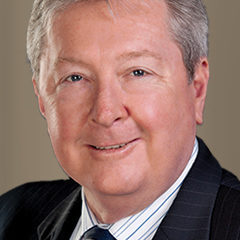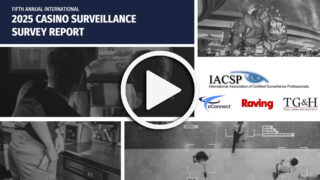
The top five ways to know your surveillance department is contributing to the bottom line
The craps pit had been losing for almost two years. In fact, the win percentage was down almost two points from where it had been for as long as anyone could remember. The continued loss drew the attention of the GM and the CEO. No one could provide any answers to them.
This was a problem because this was a Strip property that had had very strong craps play for a long time, and it had always been counted on to provide significant profits. Nothing had changed, except that they were losing.
Fearing cheating or theft, the CEO told the GM to put surveillance on the problem. After a month of watching the craps games, surveillance reported that they could find nothing. The games were being dealt and played correctly, and they could account for all of the table losses. All was okay.
After a few more months of losing without explanation, the CEO had had enough. He transferred a surveillance director from another property to replace the one they had. The new director had a proven record of getting to the bottom of unusual activity and catching bad guys.
To properly investigate every aspect of the craps pit, its operation, as well as the individual games, the associated dealers and players had to be reviewed. The surveillance department had to review every player win, each table fill and credit, every marker and buyback, and every drop and count of the box.
At the end of thirty days, the director had no answers. He had no idea why the games continued to suffer.
The surveillance team redoubled their efforts without any luck. They were at a loss for answers. And the games continued to lose.
Finally, they got a break.
They caught a dealer parlaying a toke (allowing the toke bet to stay up after the bet won, usually prohibited at most casinos). This observation was reported, and the dealer was issued a written warning. The dealer went to Human Resources. Oddly (at least to the Surveillance Director), he brought the floorperson on that game with him. Even more unusual, the floorperson took the dealer’s side, stating that this player had said that the bet should ride. Unusual for a floorperson to take up with a dealer on such an issue, and even more unusual because it wasn’t true.
It was clear on the video that the player hadn’t directed anyone to parlay the toke, and that the floorperson was nowhere near the game to hear it if he had.
That changed the investigation. The surveillance team now focused on the tokes that the crap teams were receiving, and struck pay dirt. Once surveillance really looked at the tokes on the game, they were shocked. It seemed that the dealers were really liked for their services, because there were tokes all over each crap game. Much more than normal.
It was then noted that the dealers were “hard hustling”; they could be seen on camera gesturing players to toke for them, and directing where the tokes should be placed. Dealer bets were constantly parlayed, and often weren’t taken down when they lost. This was confirmed by placing shoppers on the game who could hear what was being said.
The amount of hard hustling that was occurring on a regular basis actually accounted for the loss in handle, and the drop in the win percentage.
The hard hustling answered one question, but asked another: Why were the box and floor personnel allowing the hustling to occur at all? Hard hustling is strictly prohibited.
Now the surveillance team focused on any interaction between box/floor personnel and dealers. The answer wasn’t long in coming.
It seemed that after the craps dealers finished their shift, they always cashed out their tokes at the Cage. The money was split up, and placed into envelopes for delivery to those on their team. As the dealer left to deliver the envelopes to their teammates, they were always met by the floorperson who watched their game. As the floorperson walked along with the dealer, one of the envelopes was surreptitiously passed by the dealer to the floorperson.
That was why the floorperson lied for the dealer. The dealers were “paying off” the box and floorpersonnel to allow them to hustle the players. In effect, it was open hunting season on the players, and to hell with the casino, “we’re going to get ours!”
Once the Surveillance Director reported this, immediate and drastic steps were taken to correct the problem. The craps numbers soon returned to their normal levels.
In our business, we know that all kinds of people will take shots at our money, including our own employees. In fact, we should expect it, and always be looking for it.
In my opinion, the case described above went on for far too long, and cost much more than it should have. In my experience, a proactive surveillance director would have caught this issue quickly, and it would have never grown to have had such a significant, negative impact on the bottom line.
Surveillance departments are often looked at as just a cost center, and a lot of them are just that. But a good surveillance department will contribute to the bottom line, by preventing and detecting losses that can occur anywhere on the property, and before they cost you tens to hundreds of thousands of dollars.
It’s important to remember that whoever is stealing from you, or cheating on your property, will do their utmost to hide it. And if they’re successful at it, you may not even know that you’re missing it. That’s how a proactive surveillance department contributes to your bottom line; identifying and stopping the hidden thefts, frauds, and scams that happen at every property.
How do you know that your surveillance department is protecting and contributing to your bottom line? Look for these signs:
1. Surveillance regularly reports the independent detection of losses.
Surveillance locates theft, fraud, cheating, and advantage play on its own. A lot of surveillance rooms are often told by another department, or by an executive, that something is going on. While this is okay, and even encouraged, the vast majority of detections should come from surveillance itself, and on a regular basis.
2. Surveillance reports arising issues and concerns.
Proactive surveillance departments monitor the pulse of the property and its departments. They know when something is suspicious or unusual, and the Surveillance Director won’t hesitate to bring those concerns to the GM or other responsible executives.
3. Surveillance detects issues in all areas, not just the casino.
A number of the larger scams, thefts and frauds occurring nowadays are happening away from our games. Players club, bars and restaurants, nightclubs and party pools, convention centers, etc., are getting hit on a regular basis. A good surveillance team will detect activity in these areas just as often as the casino, if not more.
4. Surveillance uses data, exception reports, and gaming analysis reports to identify loss areas.
Usually, the detection of a well-planned and hidden theft requires the use of information, such as: cost of sales reports, void/no sales exception reports, or game reports, indicating that a game is consistently losing, to allow surveillance to focus specifically on an existing problem. In today’s world, surveillance must use information as a part of their program to detect crime and other issues.
5. Surveillance supports and has a working relationship with all departments.
Every department is vulnerable to theft, fraud, and employee misconduct. A good surveillance department works with all of them to assist in the protection of their department, and works with the department management team to resolve problems and concerns.
These five things, and some others, describe an effective and proactive surveillance department that makes solid contributions to the bottom line by preventing significant loss. Where does your surveillance department stand?







